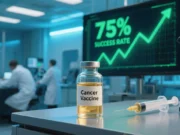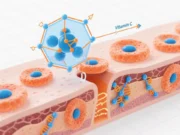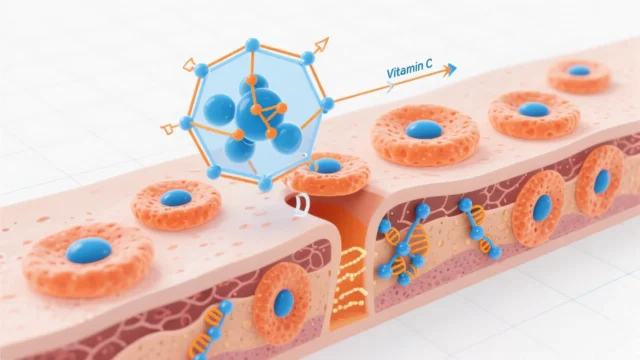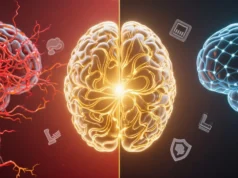Big Pharma spent billions developing genetic anti-aging treatments. Turns out, a $5 vitamin has been doing it all along.
Want to know something that’ll make you question everything the beauty industry has been selling you?
A simple vitamin just got caught red-handed reprogramming human DNA to reverse skin aging.
Not “helping with collagen” or “providing antioxidants.” I’m talking about literally switching on your skin’s youth genes and telling your cells to act decades younger.
And here’s the kicker: This breakthrough didn’t come from some high-tech lab or $50,000 gene therapy clinic. It came from researchers in Japan who decided to take a closer look at something sitting in your medicine cabinet right now.
Vitamin C.
The Discovery That Changes Everything
Scientists at the Tokyo Metropolitan Institute for Geriatrics and Gerontology just published research that should be front-page news everywhere.
They didn’t just prove vitamin C makes your skin look better. They proved it literally rewrites your genetic code to reverse aging.
Dr. Akihito Ishigami and his team used lab-grown human skin models—essentially real human skin grown in a laboratory—and dosed them with vitamin C at concentrations your body naturally receives from your bloodstream.
What they found will blow your mind.
Within 7 days, the vitamin C-treated skin showed dramatically thicker cell layers. By day 14, the results were even more pronounced. But here’s the bombshell: It wasn’t just growing new skin cells. It was reactivating dormant “youth genes” that had been switched off by aging.
How Vitamin C Hacks Your DNA
Here’s where it gets technical—but stick with me because this is the part that matters most.
As you age, your DNA gets “methylated.” Think of methylation like someone putting tape over switches in your genetic control room. When genes get methylated, they get switched off—permanently.
The genes that make thick, healthy, youthful skin? They’re some of the first to get taped shut.
But vitamin C does something remarkable. It promotes “DNA demethylation”—literally removing that tape and switching your youth genes back on.
The Japanese researchers identified over 10,138 different genetic regions where vitamin C removed the methylation. They watched as 12 key skin-growth genes increased their activity by 1.6 to 75 times normal levels.
That’s not improvement. That’s transformation.
The Enzyme Connection They Don’t Want You to Know
Here’s the part that’ll make Big Pharma executives lose sleep:
Vitamin C works by sustaining something called TET enzymes—the molecular machines that remove methylation from your DNA. These enzymes need a steady supply of electrons to keep working, and vitamin C provides exactly that.
Without vitamin C, your TET enzymes shut down. Your youth genes stay switched off. Your skin keeps thinning.
With adequate vitamin C? Your cells literally start acting decades younger.
The researchers proved this by blocking the TET enzymes with inhibitors. Immediately, all the anti-aging effects vanished. Proof positive that vitamin C’s fountain-of-youth effects work through genetic reprogramming.
Why Your Doctor Never Told You This
Think about it: If a$5 vitamin can reprogram your DNA to reverse aging, what does that do to the multi-billion-dollar anti-aging industry?
-$500 serums with “peptides” -$10,000 laser treatments
-$25,000 genetic therapies
All made obsolete by something you can buy at any grocery store.
The research is published in the Journal of Investigative Dermatology—one of the most respected skin science journals in the world. This isn’t speculation. It’s documented fact.
But notice how this groundbreaking discovery isn’t headlines on every major news network? Notice how your dermatologist isn’t calling you with the news?
There’s no money in telling you the truth.
The Real Numbers
Let me give you the hard data the beauty industry doesn’t want you to see:
- 90% of your outer skin layer is made up of keratinocytes—the cells that provide your skin’s thickness and protection
- Vitamin C increased keratinocyte production by measurable amounts within days
- Ki-67 positive cells (actively dividing cells) increased dramatically in vitamin C-treated skin
- 12 different proliferation genes showed massive increases in activity
Super Age reports that this research “suggests vitamin C may be particularly helpful for older adults or those with damaged or thinning skin, boosting the skin’s natural capacity to regenerate and strengthen itself.”
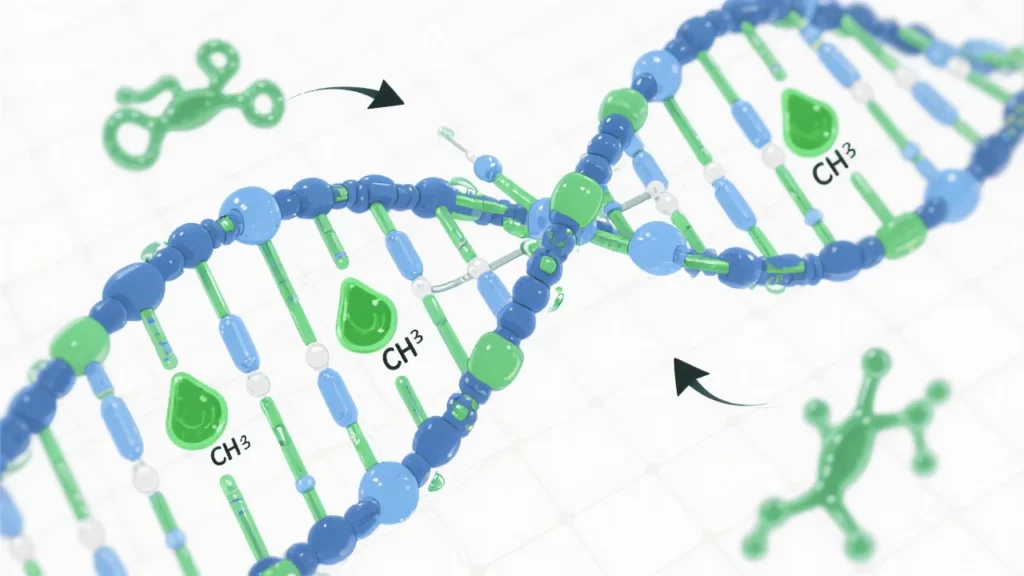
What This Means for You
Every time you take vitamin C, you’re not just getting an antioxidant. You’re sending molecular instructions to your DNA to turn your youth genes back on.
But here’s what the researchers want you to understand: They used concentrations “comparable to those typically transported from the bloodstream into the epidermis.”
In other words, normal vitamin C blood levels are enough to trigger these genetic changes.
Dr. Ishigami concludes: “We found that VC helps thicken the skin by encouraging keratinocyte proliferation through DNA demethylation, making it a promising treatment for thinning skin, especially in older adults.”
The Bottom Line
While you’ve been spending hundreds of dollars on miracle creams and procedures, vitamin C has been sitting there, ready to flip your genetic switches back to “young.”
This isn’t about supplementation. This is about genetic reprogramming.
The beauty industry built a fortune convincing you that aging was inevitable and expensive to fight. Turns out, nature equipped you with the tools to reverse it—you just needed to know how to use them.
Your DNA has been waiting for this message. Time to send it.
Note: The research used vitamin C concentrations equivalent to normal blood levels, suggesting that adequate dietary vitamin C or appropriate supplementation may provide these genetic benefits. As always, consult with a healthcare provider about your individual vitamin C needs.
Sources:




